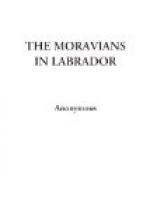of a soul without Christ, which made them cry to him
for mercy; and they had truly experienced grace and
the forgiveness of sin in his precious blood, by which
their hearts were filled with joy and comfort in believing.
Out of the abundance of their hearts, therefore, their
mouths spake of the love and power of Jesus, by which
a very serious impression was made on the whole inhabitants
of the settlement, and all longed to be partakers
of the same grace. This spark of the Lord’s
own kindling spread rapidly; and the missionaries had
daily visits, either from inquirers crying out, what
shall we do to be saved? or from those who had obtained
peace, to tell them what the Lord had done for them.
A widow, in reference to a conversation she had with
one of the missionaries the day before, expressed
herself thus: “Now I rejoice that I can
again visit the meetings, where I hear of Him who,
notwithstanding all my worthlessness, has
so
loved me! When we are assembled, I will ever
pray to Jesus that he would put such words in your
mouth as will speak to my heart.” Another
said, “I am often moved to tears when I consider
what God my Saviour has done for me. I start
back with terror when I reflect upon my former wicked
life. I have been an abominable sinner; and that
Jesus should have received me in mercy, and granted
me to believe that his blood can wash away all my
sins, and deliver me from the power of evil, is a favour
so great that I am amazed at it, and sink down with
shame and gratitude. I can do nothing but look
to him. I am as one walking upon a smooth sheet
of ice, and obliged at every step to guard against
falling. He must uphold me, and for this my heart
is constantly lifted up in prayer to him.”
The observation of a third was, “I am convinced
that I have hitherto failed in truly hungering and
thirsting after the love of the Saviour; since my
baptism I have been as one standing where the road
is divided.” Several others made similar
declarations.
While this heavenly flame was in full blaze at Hopedale,
two young Esquimaux, Siksigak and Kapik, arrived there
from Nain, February 1805. Their parents were
both baptized; they were as wild as the wildest of
the heathen. The former had separated from his
wife, who was baptized, for some time and meant to
convey her back to her mother, to get rid of an incumbrance,
intending to marry another at Nain, who promised to
second him better in his heathenish abominations—to
leave the believers altogether, and along with his
companion, to enjoy his freedom, and live with him
in the gratification of every evil lust. But
they were both arrested by the power of the Lord.
Siksigak, as soon as they reached Hopedale, took his
wife, Benigna, to her mother, the widow Rachel’s,
and pushing her in said, “Never come more in
my sight.” He then went to his own mother’s
house, on entering which he found the Esquimaux engaged
in prayer, as was their custom before they went to
rest; for she had been converted, joined the church,




